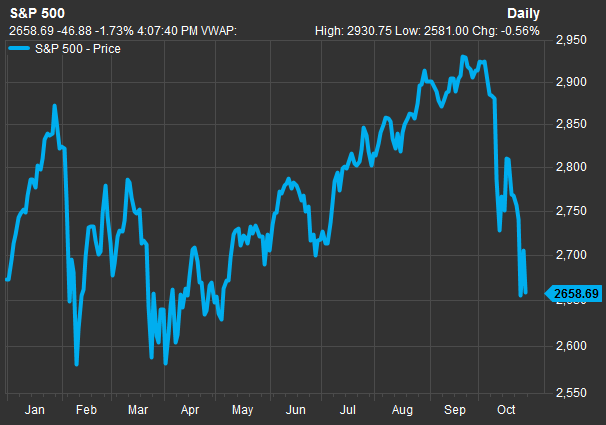As stock markets steadily climbed during his first year in office, President Donald Trump cheered the rise at every turn.
But the president has stayed silent as he watched this year's gains disappear in recent days.
Good financial market and economic news greeted Trump after his inauguration in January 2017. Hopes about his push to slash regulations and chop corporate tax rates unlocking economic growth helped to drive stock market records. The president gleefully claimed rising stocks as evidence of his success.
Trump tweet
Now, he has to grapple with an unknown: a stock market that has recently slipped, partly due to the president's own policies. While gross domestic product has improved, market watchers appear disappointed with the prospects for earnings growth. Interest rate hikes from a Federal Reserve chairman the president appointed — and routinely criticizes — along with a widening trade war with China have spooked investors.
The recent stock losses may prove short-lived. The market pain has so far not hurt Trump's approval rating ahead of the critical Nov. 6 midterm elections, though booming equities last year did little to help Americans' views of the president. Still, the stock struggles at least temporarily erase one of the factors the president pointed to as evidence of success throughout his first year.
Stocks surged from Jan. 23, 2017, the first trading day after Trump's inauguration, until the end of last year. The Dow Jones industrial average, S&P 500 and Nasdaq Composite climbed about 25 percent, 18 percent and 24 percent, respectively, during that time, according to FactSet data.
.1540583423454.png)
This year has gone much differently for markets. The Dow and S&P have dipped 0.1 percent and 0.6 percent, respectively, this year. Only the Nasdaq has stayed positive, rising 3.8 percent.

As of Friday's close, the Dow, S&P and Nasdaq had dropped 6.7 percent, 8.8 percent and 10.9 percent in October, respectively.
In a statement Wednesday, White House spokeswoman Lindsay Walters shrugged off the stock market troubles, saying "the fundamentals and future of the U.S. economy remain incredibly strong." She added that "we remain focused on the long-term outlook of the U.S. economy."
The investing community largely had high hopes for what Trump would do for American businesses during his first year in office. The strong stock market performance continued a steady climb that started during the Obama administration, following the 2008 financial crisis.
Stock markets cheered the Trump administration's economic policy despite comments and actions that mobilized large swaths of the country against the president. His restrictions on travel for people from several Muslim-majority countries, the GOP plan to repeal the Affordable Care Act and his remarks equating white nationalists with protesters demonstrating against them in Charlottesville, Va., all contributed to a poor approval rating.
Days after Trump took office, he signed an executive order aiming to roll back regulations and stop the creation of new rules. He has since taken various other steps to scale back regulations, which Republicans and the business community have largely cheered.
Anticipation of tax cuts, and subsequently stronger corporate earnings, boosted stocks throughout 2017. In December, Republicans passed a plan to slash tax rates for corporations and pass-through businesses and temporarily trim rates for most individuals. Trump repeatedly contended the law would boost job and GDP growth — and help stocks in the process.
Trump tweet
The script has flipped this year. Stock markets endured a rough February, driven in part by an expectation of rising interest rates and more aggressive Federal Reserve policy.
Shortly after that, Trump started his policy of imposing tariffs on imports in order to pressure allies into striking new trade deals. He first put duties on steel and aluminum. Then, Washington and Beijing began imposing an escalating series of tariffs, with the Trump administration most recently slapping 10 percent duties on $200 billion in Chinese goods last month. Those rise to 25 percent at the end of the year, and Trump is considering another $267 billion in tariffs.
The trade conflict has led to concerns about a widening economic war that could raise costs for businesses and consumers and damage economic growth. Trade negotiations between the U.S. and China have stalled. The Trump administration reportedly wants Beijing to come up with a specific proposal to stop the alleged theft of intellectual property before talks start again, which complicates any effort to make progress on trade.
As markets have reacted poorly to the Fed's three interest rate increases this year, the president has increasingly lashed out at the politically independent central bank. In a Wall Street Journal interview this week, he said he was "very unhappy with the Fed because [President Barack] Obama had zero interest rates."
Trump added that he "maybe" regrets appointing Fed Chair Jerome Powell to the post.
Trump's top economic advisor, for his part, claimed fears about Democrats winning a House majority drove the market declines more than concerns about slowing global economic growth and rising interest rates. On Tuesday, National Economic Council Director Larry Kudlow told reporters that "I think the stock market is worried that Congress will change and will overturn these pro-growth policies."
Many market experts believe October's carnage will be short-lived. Trump will likely start talking up the stock market again when the pain ends.
Take his last tweet cheering on the stock market. It came on Oct. 16, when major indexes rose more than 2 percent following a week of carnage.
First, he noted that the Dow rose 548 points.
Trump tweet
The next day, Trump referenced what he said was a quote from "Fox & Friends," a morning TV show the president frequently watches that covers him favorably. "Network News gave Zero coverage to the Big Day the Stock Market had yesterday," he wrote, apparently quoting an unidentified speaker.
The Dow has fallen 3.7 percent since Oct. 17. The president has not tweeted about the market since.
— Additional reporting by CNBC's Fred Imbert
No comments:
Post a Comment